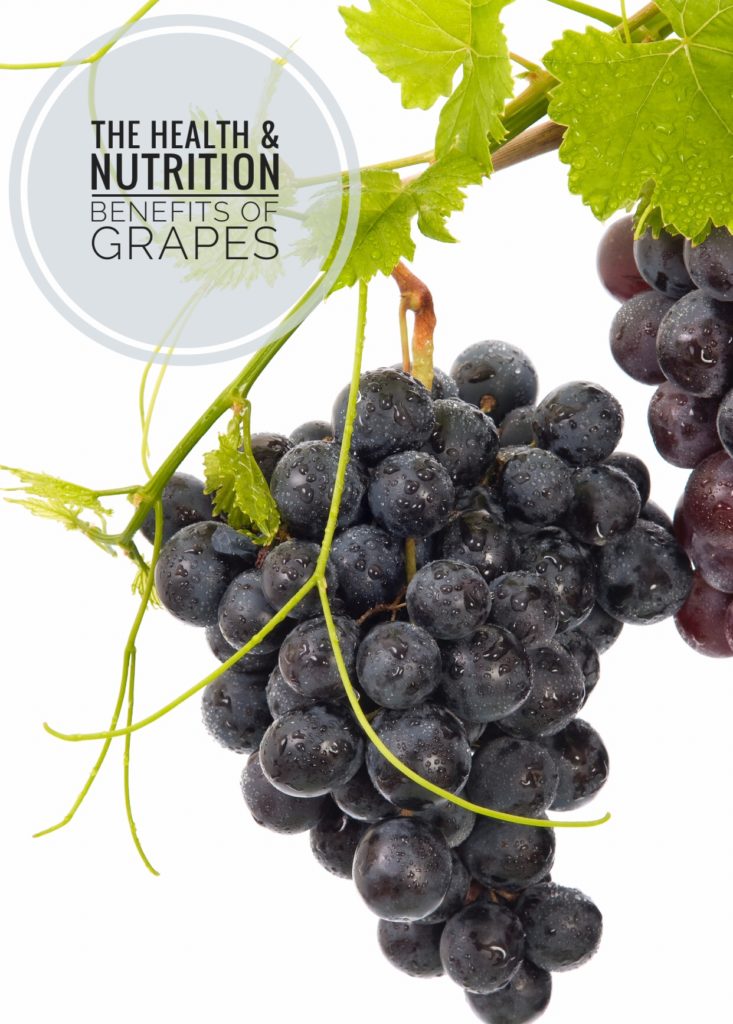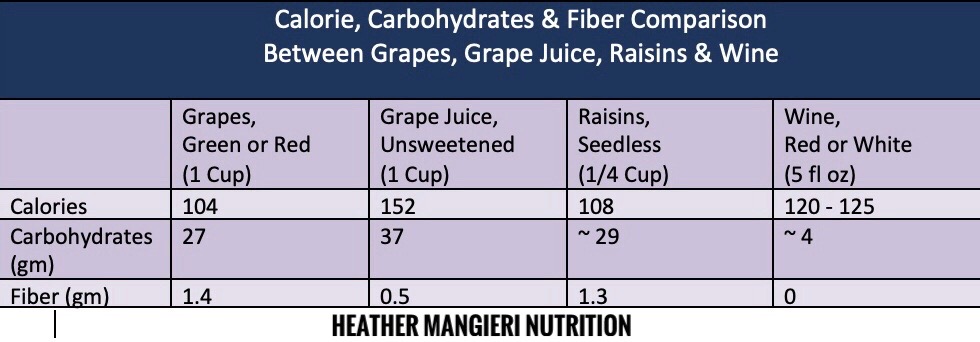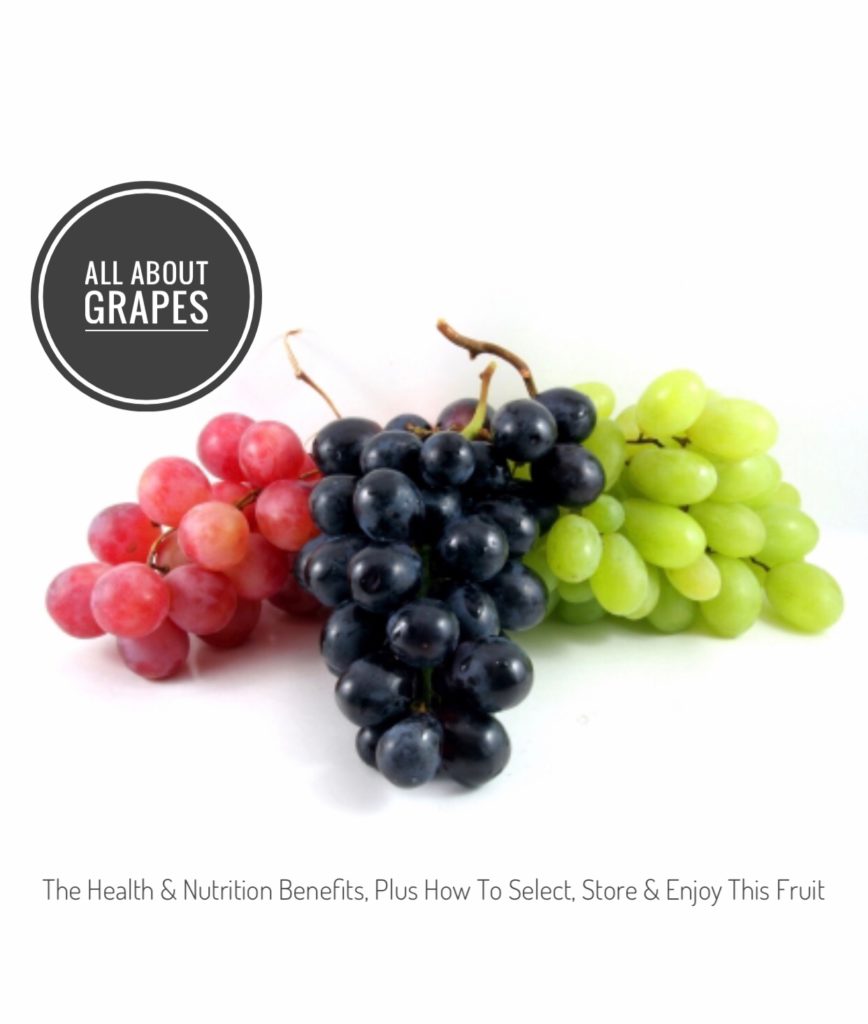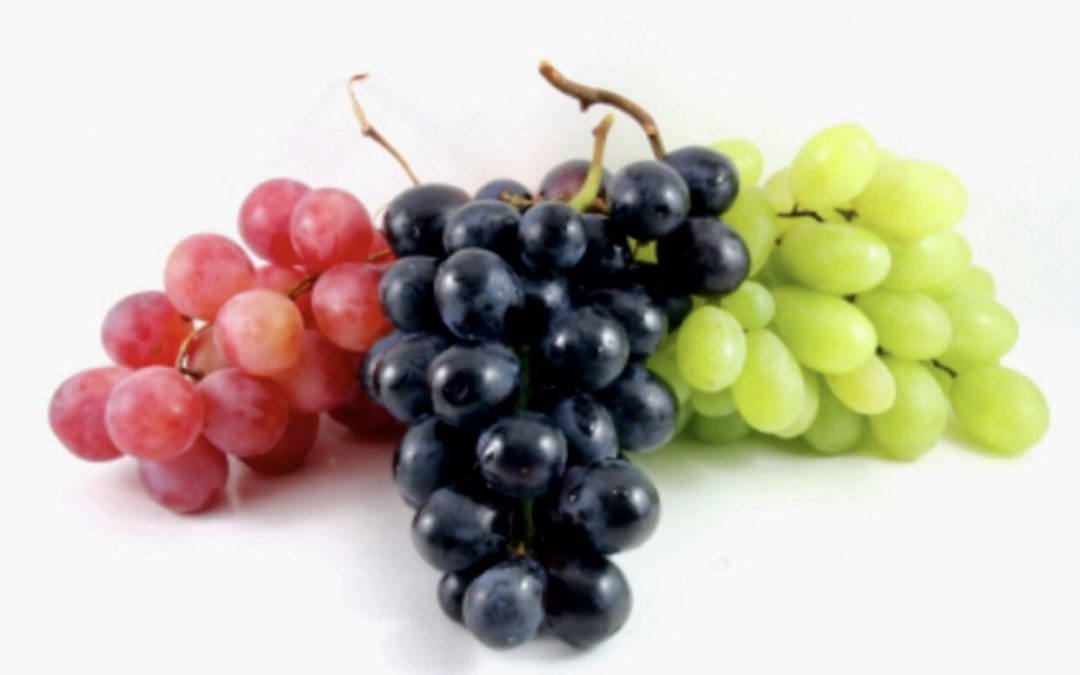
You may have heard about the health benefits of red wine, but what about grapes? There’s a lot less talk about grapes, which is odd considering wine is made from them. Grapes don’t get the attention that they deserve, so this post is meant to change that.
Nutrition in Grapes
Grapes can be consumed in a few different forms (Note: Grape soda is not one of them). Fresh grapes, grape juice, raisins and wine are all made from grapes.

When it comes to nutrition, you get the biggest bang for your calorie buck if you choose fresh grapes. They are a rich source of carbohydrates, and are the only form that provides a noteable amount fo fiber One cup of fresh grapes has about the same amount of calories as ¼ cup of raisins (which are just dried grapes.) They are an excellent source of manganese and a good source of thiamin, vitamin B6, vitamin C, and potassium. All of those nutrients play an important role in keeping our bodies functioning properly.
Like all juices, grape juice has a higher calorie count and a lower fiber content than the fresh fruit.
Health Benefits of Grapes
Grapes are loaded with phytonutrients. Listing them all would be excessive, but here are a few that you may be familiar with from some of our other blog posts:
- Quercetin (Read more in our post about cherries)
- Catechins
- Anthocyanins (Read more in our post about red raspberries)
- Lutein (Read more in our post about kiwifruit)
- Resveratrol
Resveratrol
Of all of the phytonutrients in grapes (many of which are not listed), the one that receives the most attention is resveratrol. This polyphenol is found in the skin of grapes, and is synthesized as a defense mechanism against infection during growth. It has been touted for its health benefits, and because of that, has become increasingly popular as a dietary supplement.
It is important to note that studies on resveratrol supplements have all been conducted in animal experiments. No human trials have been conducted specifically showing these benefits. Optimistic results from animal trials cannot be accurately concluded to humans, so when it comes to resveratrol supplements, buyers beware. Supplements are loosely regulated, and the purity, efficacy and dosage of these products may not be what it is advertised as.
Another point to keep in mind: Not all grapes are created equal when it comes to phytonutrient content. Dark red and purple grapes tend to have a higher concentration compared to their white counterparts.
What About Wine?
As mentioned before, you can’t have wine without grapes. But, why is it that wine tens to get more praise than the fruit itself? Here’s the answer: The fermentation process used to make wine releases resveratrol from the grape’s skin. This makes the polyphenol more available for our bodies to absorb. Just remember that moderate alcohol intake is two drinks a day for men and one drink a day for women, and more than that can lead to negative health outcomes. One drink is considered to be 12 fl oz of regular beer, 5 fl oz of table wine or a 1.5 fl oz shot of 80-proof spirits.
Even though wine provides resvertrol, the best way to get a wide variety of polyphenols is by eating a healthy, well-balanced diet – including grapes.

Selecting, Storing, Preparing Fresh Grapes
- Select grapes that are plump and firm. Choose a bundle with the grapes still firmly attached to their stem.
- Store them in the refrigerator for up to 1 week.
- Note: Raisins should also be stored in the refrigerator once opened.
- Wash prior to eating
Ways to Enjoy Grapes
- Feeling fancy? Make a platter with crackers, cheese, and grapes for a fun party treat or a night at home. (Bonus: use whole-wheat crackers)
- Dip them in chocolate (use dark chocolate for added benefits)
- Add grapes to a fruit salad and sweeten up a chicken salad
- Add them to a smoothie
- Grapes pair wonderfully with grains. Add grapes to a chilled quinoa or wheatberry salad.
- Freeze them! They can be used as ice cubes or alone as a cool snack.
- Don’t have time to freeze them? That’s fine! Grapes are a delicious, portable treat. They’re perfect when packing lunches
Other Considerations
Grapes can be a choking hazard in children, so when offering them to small children, slice them into quarters to reduce the choking risk.


 Hi, I’m Heather – a registered dietitian, busy mom, consultant, adventure junkie and travel addict who has mastered living healthy on the go. My blog is where I share simple recipes and healthy living tips to help and inspire others to live their best life.
Hi, I’m Heather – a registered dietitian, busy mom, consultant, adventure junkie and travel addict who has mastered living healthy on the go. My blog is where I share simple recipes and healthy living tips to help and inspire others to live their best life.